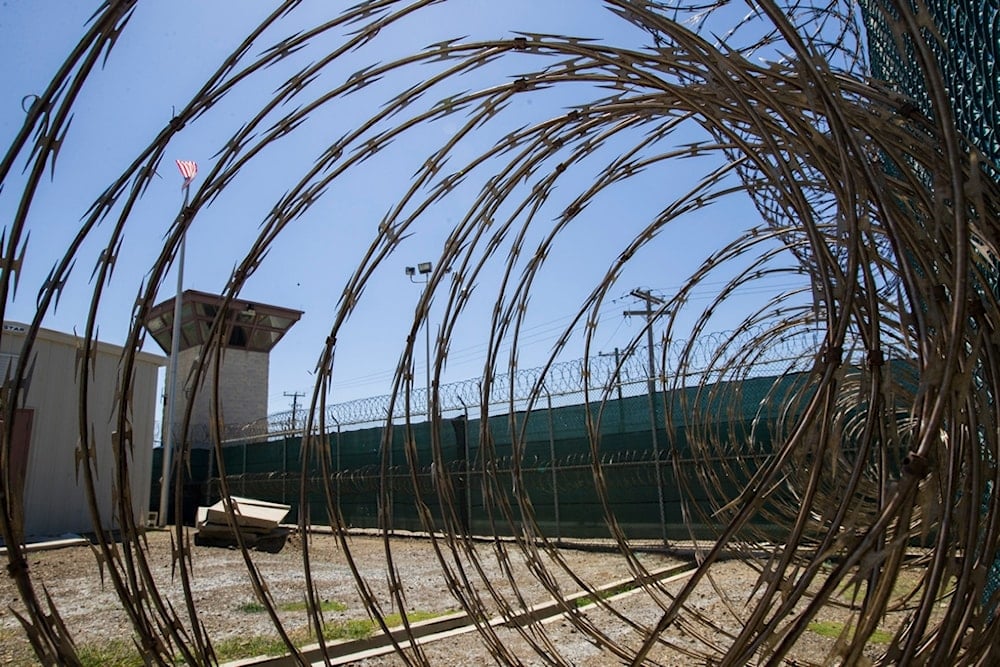Three Guantanamo prisoners repatriated, 27 remain in notorious jail
Two Malaysians accused of involvement in Southeast Asia bombings will face additional sentences in Malaysia, while a Kenyan charged with ties to al-Qaeda in East Africa has been repatriated to his home country.
-

In this April 17, 2019, photo, reviewed by US military officials, the control tower is seen through the razor wire inside the Camp VI detention facility in Guantanamo Bay Naval Base, Cuba. (AP)
Three of the remaining 30 detainees at Guantanamo Bay have been repatriated to their home countries, with two going to Malaysia and one to Kenya, the Pentagon confirmed on Wednesday.
Malaysians Mohammed Farik bin Amin and Mohammed Nazir bin Lep pleaded guilty in January to charges of murder, conspiracy, and other offenses as members of Jemaah Islamiya, an al-Qaeda affiliate in Southeast Asia. This group was responsible for several deadly bombings in the early 2000s. They were arrested in 2003 in Thailand alongside Hambali, the group's leader, and were held in the CIA's secret "black sites" before being transferred to Guantanamo Bay in 2006.
As part of a plea agreement, the two Malaysians agreed in January to provide testimonies for proceedings against Nurjaman and will serve an additional "confinement for approximately five years" in Malaysia, according to a Pentagon statement released after their scheduled departure on Wednesday.
"On Nov. 14, 2024, Secretary of Defense (Lloyd) Austin notified Congress of his intent to repatriate bin Amin and bin Lep to Malaysia, and, in consultation with our partners in Malaysia, we completed the requirements for responsible transfer," the department said in a statement.
The third detainee, Mohammed Abdul Malik Bajabu, was repatriated to Kenya on Tuesday. Arrested by Kenyan authorities in 2007 and accused of links to al-Qaeda's East Africa branch, Bajabu was one of the last five detainees held after being seized as suspects following the 9/11 attack on the United States,
A Pentagon review board stated that it had taken into account Bajabu’s "low level of training and lack of leadership role in his pre-detention activities," along with his family connections and behavior while in detention, in deciding to approve his transfer.
Dive deeper
Bajabu, along with 15 other detainees, was cleared for release several years ago by the review board, which was set up by Former US President Barack Obama as part of an effort to close Guantanamo Bay citing reiterating calls demanding the US government to shut down the infamous prison for harrowing torture and systemic abuse of suspects.
President Joe Biden also vowed to shut down the facility early in his term. However, for this to happen, the administration must negotiate transfer agreements with the detainees’ home countries or third nations, a process that has proven slow and complex.
Eleven of the 15 detainees still awaiting transfer are Yemenis, whose planned relocation to a Middle Eastern country was delayed after the beginning of the Israeli war on Gaza which led to regional instability.
President Biden had promised to transfer all the cleared detainees before his term ended on January 20. So far, about two dozen have been moved. Last month, in accordance with legal requirements, the administration informed Congress of its plans to relocate the remaining 15 cleared detainees 30 days before their transfer. However, with only five weeks remaining in his term, it seems unlikely that all will be moved before then.
Read next: 'Cruel, inhuman, degrading': UN demands US apology over Guantanamo Bay
Driving the news
President-elect Donald Trump has not yet outlined his plans for the Guantanamo Bay prison. During his first term, he halted President Obama’s efforts to close the facility, issuing an executive order that prohibited its closure, as part of the US naval base.
With the departure of the two Malaysians, 12 detainees who have not been cleared for release remain, according to the Pentagon. Three of them are eligible for review, two have been convicted and sentenced by military commissions, and seven are "involved in the military commissions process." These trials have been protracted, partly because much of the evidence against the detainees, obtained through methods widely regarded as torture at CIA secret sites, is inadmissible.
Among those still in the commission process are Khalid Sheikh Mohammed and two others charged with planning and executing the 9/11 attacks. After years of negotiations, the three agreed in July to plead guilty in exchange for avoiding the death penalty. However, Defense Secretary Lloyd Austin later annulled the plea agreement, citing the significance of the deal. Last month, the Air Force judge overseeing the case ruled that Austin had no legal grounds to intervene, allowing the plea to stand. Austin has not yet indicated whether he will challenge this ruling.
Read more: DeSantis role in Guantanamo Bay killings exposed with a holed report

 5 Min Read
5 Min Read








